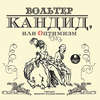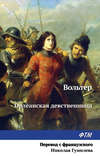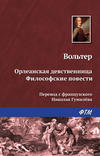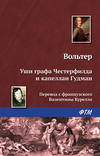Читать книгу: «A Philosophical Dictionary, Volume 03»
CANNIBALS
SECTION I
We have spoken of love. It is hard to pass from people kissing to people eating one another. It is, however, but too true that there have been cannibals. We have found them in America; they are, perhaps, still to be found; and the Cyclops were not the only individuals in antiquity who sometimes fed on human flesh. Juvenal relates that among the Egyptians – that wise people, so renowned for their laws – those pious worshippers of crocodiles and onions – the Tentyrites ate one of their enemies who had fallen into their hands. He does not tell this tale on hearsay; the crime was committed almost before his eyes; he was then in Egypt, and not far from Tentyra. On this occasion he quotes the Gascons and the Saguntines, who formerly fed on the flesh of their countrymen.
In 1725 four savages were brought from the Mississippi to Fontainebleau, with whom I had the honor of conversing. There was among them a lady of the country, whom I asked if she had eaten men; she answered, with great simplicity that she had. I appeared somewhat scandalized; on which she excused herself by saying that it was better to eat one's dead enemy than to leave him to be devoured by wild beasts, and that the conquerors deserved to have the preference. We kill our neighbors in battles, or skirmishes; and, for the meanest consideration, provide meals for the crows and the worms. There is the horror; there is the crime. What matters it, when a man is dead, whether he is eaten by a soldier, or by a dog and a crow?
We have more respect for the dead than for the living. It would be better to respect both the one and the other. The nations called polished have done right in not putting their vanquished enemies on the spit; for if we were allowed to eat our neighbors, we should soon eat our countrymen, which would be rather unfortunate for the social virtues. But polished nations have not always been so; they were all for a long time savage; and, in the infinite number of revolutions which this globe has undergone, mankind have been sometimes numerous and sometimes scarce. It has been with human beings as it now is with elephants, lions, or tigers, the race of which has very much decreased. In times when a country was but thinly inhabited by men, they had few arts; they were hunters. The custom of eating what they had killed easily led them to treat their enemies like their stags and their boars. It was superstition that caused human victims to be immolated; it was necessity that caused them to be eaten.
Which is the greater crime – to assemble piously together to plunge a knife into the heart of a girl adorned with fillets, or to eat a worthless man who has been killed in our own defence?
Yet we have many more instances of girls and boys sacrificed than of girls and boys eaten. Almost every nation of which we know anything has sacrificed boys and girls. The Jews immolated them. This was called the Anathema; it was a real sacrifice; and in Leviticus it is ordained that the living souls which shall be devoted shall not be spared; but it is not in any manner prescribed that they shall be eaten; this is only threatened. Moses tells the Jews that unless they observe his ceremonies they shall not only have the itch, but the mothers shall eat their children. It is true that in the time of Ezekiel the Jews must have been accustomed to eat human flesh; for, in his thirty-ninth chapter, he foretells to them that God will cause them to eat, not only the horses of their enemies, but moreover the horsemen and the rest of the warriors. And, indeed, why should not the Jews have been cannibals? It was the only thing wanting to make the people of God the most abominable people upon earth.
SECTION II
In the essay on the "Manners and Spirit of Nations" we read the following singular passage: "Herrera assures us that the Mexicans ate the human victims whom they immolated. Most of the first travellers and missionaries say that the Brazilians, the Caribbees, the Iroquois, the Hurons, and some other tribes, ate their captives taken in war; and they do not consider this as the practice of some individuals alone, but as a national usage. So many writers, ancient and modern, have spoken of cannibals, that it is difficult to deny their existence. A hunting people, like the Brazilians or the Canadians, not always having a certain subsistence, may sometimes become cannibals. Famine and revenge accustomed them to this kind of food; and while in the most civilized ages we see the people of Paris devouring the bleeding remains of Marshal d'Ancre, and the people of The Hague eating the heart of the grand pensionary, De Witt, we ought not to be surprised that a momentary outrage among us has been continual among savages.
"The most ancient books we have leave no room to doubt that hunger has driven men to this excess. The prophet Ezekiel, according to some commentators, promises to the Hebrews from God that if they defend themselves well against the king of Persia, they shall eat of 'the flesh of horses and of mighty men.'
"Marco Polo says that in his time in a part of Tartary the magicians or priests – it was the same thing – had the privilege of eating the flesh of criminals condemned to death. All this is shocking to the feelings; but the picture of humanity must often have the same effect.
"How can it have been that nations constantly separated from one another have united in so horrible a custom? Must we believe that it is not so absolutely opposed to human nature as it appears to be? It is certain that it has been rare, but it is equally certain that it has existed. It is not known that the Tartars and the Jews often ate their fellow creatures. During the sieges of Sancerre and Paris, in our religious wars, hunger and despair compelled mothers to feed on the flesh of their children. The charitable Las Casas, bishop of Chiapa, says that this horror was committed in America, only by some nations among whom he had not travelled. Dampierre assures us that he never met with cannibals; and at this day there are not, perhaps, any tribes which retain this horrible custom."
Americus Vespucius says in one of his letters that the Brazilians were much astonished when he made them understand that for a long time the Europeans had not eaten their prisoners of war.
According to Juvenal's fifteenth satire, the Gascons and the Spaniards had been guilty of this barbarity. He himself witnessed a similar abomination in Egypt during the consulate of Junius. A quarrel happening between the inhabitants of Tentyra and those of Ombi, they fought; and an Ombian having fallen into the hands of the Tentyrians, they had him cooked, and ate him, all but the bare bones. But he does not say that this was the usual custom; on the contrary, he speaks of it as an act of more than ordinary fury.
The Jesuit Charlevoix, whom I knew very well, and who was a man of great veracity, gives us clearly to understand in his "History of Canada," in which country he resided thirty years, that all the nations of northern America were cannibals; since he remarks, as a thing very extraordinary, that in 1711 the Acadians did not eat men.
The Jesuit Brebeuf relates that in 1640 the first Iroquois that was converted, having unfortunately got drunk with brandy, was taken by the Hurons, then at war with the Iroquois. The prisoner, baptized by Father Brebeuf by the name of Joseph, was condemned to death. He was put to a thousand tortures, which he endured, singing all the while, according to the custom of his country. They finished by cutting off a foot, a hand, and lastly his head; after which the Hurons put all the members into a cauldron, each one partook of them, and a piece was offered to Father Brebeuf.
Charlevoix speaks in another place of twenty-two Hurons eaten by the Iroquois. It cannot, then, be doubted, that in more countries than one, human nature has reached this last pitch of horror; and this execrable custom must be of the highest antiquity; for we see in the Holy Scriptures that the Jews were threatened with eating their children if they did not obey their laws. The Jews are told not only that they shall have the itch, and that their wives shall give themselves up to others, but also that they shall eat their sons and daughters in anguish and devastation; that they shall contend with one another for the eating of their children; and that the husband will not give to his wife a morsel of her son, because, he will say, he has hardly enough for himself.
Some very bold critics do indeed assert that the Book of Deuteronomy was not composed until after the siege of Samaria by Benhadad, during which, it is said in the Second Book of Kings, that mothers ate their children. But these critics, in considering Deuteronomy as a book written after the siege of Samaria, do but verify this terrible occurrence. Others assert that it could not happen as it is related in the Second Book of Kings. It is there said: "And as the king of Israel was passing by upon the wall [of Samaria], there cried a woman unto him, saying, 'Help, my lord, O king.' And he said, 'If the Lord do not help thee, whence shall I help thee? out of the barn floor? or out of the wine-press?' And the king said unto her, 'What aileth thee?' And she answered, 'This woman said unto me, give thy son, that we may eat him to-day, and we shall eat my son to-morrow. So we boiled my son, and did eat him; and I said unto her on the next day, 'Give thy son, that we may eat him,' and she hath hid her son.'"
These censors assert that it is not likely that while King Benhadad was besieging Samaria, King Joram passed quietly by the wall, or upon the wall, to settle differences between Samaritan women. It is still less likely that one child should not have satisfied two women for two days. There must have been enough to feed them for four days at least. But let these critics reason as they may, we must believe that fathers and mothers ate their children during the siege of Samaria, since it is expressly foretold in Deuteronomy. The same thing happened at the siege of Jerusalem by Nebuchadnezzar; and this, too, was foretold by Ezekiel.
Jeremiah exclaims, in his "Lamentations": "Shall the women eat their fruit, and children of a span long?" And in another place: "The hands of the pitiful women have sodden their own children." Here may be added the words of Baruch: "Man has eaten the flesh of his son and of his daughter."
This horror is repeated so often that it cannot but be true. Lastly, we know the story related in Josephus, of the woman who fed on the flesh of her son when Titus was besieging Jerusalem. The book attributed to Enoch, cited by St. Jude, says that the giants born from the commerce of the angels with the daughters of men were the first cannibals.
In the eighth homily attributed to St. Clement, St. Peter, who is made to speak in it, says that these same giants quenched their thirst with human blood and ate the flesh of their fellow creatures. Hence resulted, adds the author, maladies until then unknown; monsters of all kinds sprung up on the earth; and then it was that God resolved to drown all human kind. All this shows us how universal was the reigning opinion of the existence of cannibals.
What St. Peter is made to say in St. Clement's homily has a palpable affinity with the story of Lycaon, one of the oldest of Greek fables, and which we find in the first book of Ovid's "Metamorphoses."
The "Relations of the Indies and China," written in the eighth century by two Arabs, and translated by the Abbé Renaudot, is not a book to which implicit credit should be attached; far from it; but we must not reject all these two travellers say, especially when their testimony is corroborated by that of other authors who have merited some belief. They tell us that there are in the Indian Sea islands peopled with blacks who ate men; they call these islands Ramni.
Marco Polo, who had not read the works of these two Arabs, says the same thing four hundred years after them. Archbishop Navarette, who was afterwards a voyager in the same seas, confirms this account: "Los Europeos que cogen, es constante que vivos se los van comiendo."
Texeira asserts that the people of Java ate human flesh, which abominable custom they had not left off more than two hundred years before his time. He adds that they did not learn milder manners until they embraced Mahometanism.
The same thing has been said of the people of Pegu, of the Kaffirs, and of several other African nations. Marco Polo, whom we have just now cited, says that in some Tartar hordes, when a criminal had been condemned to death they made a meal of him: "Hanno costoro un bestiale e orribile costume, che quando alcuno e guidicato a morte, lo tolgono, e cuocono, e mangian' selo."
What is more extraordinary and incredible is that the two Arabs attributed to the Chinese what Marco Polo says of some of the Tartars: that, "in general, the Chinese eat all who have been killed." This abomination is so repugnant to Chinese manners, that it cannot be believed. Father Parennin has refuted it by saying that it is unworthy of refutation.
It must, however, be observed that the eighth century, the time when these Arabs wrote their travels, was one of those most disastrous to the Chinese. Two hundred thousand Tartars passed the great wall, plundered Pekin, and everywhere spread the most horrible desolation. It is very likely that there was then a great famine, for China was as populous as it is now; and some poor creatures among the lowest of the people might eat dead bodies. What interest could these Arabians have in inventing so disgusting a fable? Perhaps they, like most other travellers, took a particular instance for a national custom.
Not to go so far for examples, we have one in our own country, in the very province in which I write; it is attested by our conqueror, our master, Julius Cæsar. He was besieging Alexia, in the Auxois. The besieged being resolved to defend themselves to the last extremity, and wanting provisions, a great council was assembled, in which one of the chiefs, named Critognatus, proposed that the children should be eaten one after another to sustain the strength of the combatants. His proposal was carried by a majority of voices. Nor is this all; Critognatus in his harangue tells them that their ancestors had had recourse to the same kind of sustenance in the war with the Cimbri and Teutones.
We will conclude with the testimony of Montaigne. Speaking of what was told him by the companions of Villegagnon, returned from Brazil, and of what he had seen in France, he certifies that the Brazilians ate their enemies killed in war, but mark what follows: "Is it more barbarous to eat a man when dead than to have him roasted by a slow fire, or torn to pieces by dogs and swine, as is yet fresh in our memories – and that not between ancient enemies, but among neighbors and fellow-citizens – and, which is worse, on pretence of piety and religion?" What a question for a philosopher like Montaigne! Then, if Anacreon and Tibullus had been Iroquois, they would have eaten men! Alas! alas!
SECTION III
Well; two Englishmen have sailed round the world. They have discovered that New Holland is an island larger than Europe, and that men still eat one another there, as in New Zealand. Whence come this race? supposing that they exist. Are they descended from the ancient Egyptians, from the ancient people of Ethiopia, from the Africans, from the Indians – or from the vultures, or the wolves? What a contrast between Marcus Aurelius, or Epictetus, and the cannibals of New Zealand! Yet they have the same organs, they are alike human beings. We have already treated on this property of the human race; it may not be amiss to add another paragraph.
The following are St. Jerome's own words in one of his letters: "Quid loquar de cæteris nationibus, quum ipse adolescentulus in Gallia viderim Scotos, gentem Britannicam, humanis vesci carnibus, et quum per silvas porcorum greges pecudumque reperiant, tamen pastorum nates et fæminarum papillas solere abscindere et has solas ciborum delicias arbitrari?"– What shall I say of other nations; when I myself, when young, have seen Scotchmen in Gaul, who, though they might have fed on swine and other animals of the forest, chose rather to cut off the posteriors of the youths and the breasts of the young women, and considered them as the most delicious food."
Pelloutier, who sought for everything that might do honor to the Celts, took the pains to contradict Jerome, and to maintain that his credulity had been imposed on. But Jerome speaks very gravely, and of what he saw. We may, with deference, dispute with a father of the church about what he has heard; but to doubt of what he has seen is going very far. After all, the safest way is to doubt of everything, even of what we have seen ourselves.
One word more on cannibalism. In a book which has had considerable success among the well-disposed we find the following, or words to the same effect: "In Cromwell's time a woman who kept a tallow chandler's shop in Dublin sold excellent candles, made of the fat of Englishmen. After some time one of her customers complained that the candles were not so good. 'Sir,' said the woman, 'it is because we are short of Englishmen.'"
I ask which were the most guilty – those who assassinated the English, or the poor woman who made candles of their fat? And further, I ask which was the greatest crime – to have Englishmen cooked for dinner, or to use their tallow to give light at supper? It appears to me that the great evil is the being killed; it matters little to us whether, after death, we are roasted on the spit or are made into candles. Indeed, no well-disposed man can be unwilling to be useful when he is dead.
CASTING (IN METAL)
There is not an ancient fable, not an old absurdity which some simpleton will not revive, and that in a magisterial tone, if it be but authorized by some classical or theological writer.
Lycophron (if I remember rightly) relates that a horde of robbers who had been justly condemned in Ethiopia by King Actisanes to lose their ears and noses, fled to the cataracts of the Nile and from thence penetrated into the Sandy Desert, where they at length built the temple of Jupiter Ammon.
Lycophron, and after him Theopompus, tells us that these banditti, reduced to extreme want, having neither shoes, nor clothes, nor utensils, nor bread, bethought themselves of raising a statue of gold to an Egyptian god. This statue was ordered one evening and made in the course of the night. A member of the university much attached to Lycophron and the Ethiopian robbers asserts that nothing was more common in the venerable ages of antiquity than to cast a statue of gold in one night, and afterwards throw it into a fire to reduce it to an impalpable powder, in order to be swallowed by a whole people.
But where did these poor devils, without breeches, find so much gold? "What, sir!" says the man of learning, "do you forget that they had stolen enough to buy all Africa and that their daughters' earrings alone were worth nine millions five hundred thousand livres of our currency?"
Be it so. But for casting a statue a little preparation is necessary. M. Le Moine employed nearly two years in casting that of Louis XV. "Oh! but this Jupiter Ammon was at most but three feet high. Go to any pewterer; will he not make you half a dozen plates in a day?"
Sir, a statue of Jupiter is harder to make than pewter plates, and I even doubt whether your thieves had wherewith to make plates so quickly, clever as they might be at pilfering. It is not very likely that they had the necessary apparatus; they had more need to provide themselves with meal. I respect Lycophron much, but this profound Greek and his yet more profound commentators know so little of the arts – they are so learned in all that is useless, and so ignorant in all that concerns the necessaries and conveniences of life, professions, trades, and daily occupations that we will take this opportunity of informing them how a metal figure is cast. This is an operation which they will find neither in Lycophron, nor in Manetho, nor even in St. Thomas's dream.
I omit many other preparations which the encyclopædists, especially M. Diderot, have explained much better than I could do, in the work which must immortalize their glory as well as all the arts. But to form a clear idea of the process of this art the artist must be seen at work. No one can ever learn in a book to weave stockings, nor to polish diamonds, nor to work tapestry. Arts and trades are learned only by example and practice.
Покупайте книги и получайте бонусы в Литрес, Читай-городе и Буквоеде.
Участвовать в бонусной программе




















